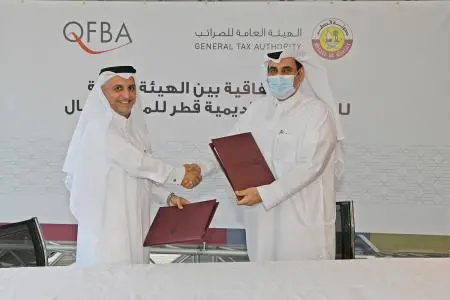PHOTO
Doha, Qatar: The General Tax Authority (GTA) has collaborated with the Qatar Finance and Business Academy (QFBA) in a signing ceremony held yesterday morning under which the QFBA would provide specialized training programs for the GTA staff. The training will enhance the knowledge transfer of internal expertise and empower national talents for organizational development purposes.
The agreement comes after a four-month coordination and work between the two parties to develop a training strategy covering various departments. The GTA aims to present the highest-quality training for its employees to enhance their expertise and contribute to developing their skills. The QFBA will present exclusive training programs to provide the opportunity for GTA's employees to benefit from all advanced materials available for training purposes.
The collaboration agreement between the GTA and the QFBA was signed at the GTA's headquarters in West Bay by His Excellency Ahmed bin Issa Al Mohannadi, President of the GTA, and Dr. Khalid Mohammed Al Horr, Chief Executive Officer of the QFBA.
The agreement is part of the GTA's endeavor to promote Qatar National Vision 2030 by implementing tax policies to enhance the government's revenues and support the diversification of Qatar's economy for future generations. The agreement also came within the core tasks of the QFBA, as a leading national institution in providing international university degrees for finance majors and accredited international professional certificate programs.
Through this partnership, the QFBA will provide experts and consultants who will conduct workshops and training courses based on the GTA's requirements for the next three years, focusing on specific areas related to the GTA's nature of business.
H.E. Ahmed Bin Issa Al Mohannadi, the GTA President said: " I am delighted today to sign a collaboration agreement with the QFBA in training and financial consultancy. This initiative confirms our commitment to raising our national talents' capabilities and competencies to keep pace with the GTA's future requirements. We have chosen to partner with the QFBA because of its great experience in this field and the high-level training programs it presents".
Dr. Khalid Mohammed Al Horr, Chief Executive Officer of the QFBA, said: "We are proud to sign this agreement with the GTA. This provides vast opportunities for training and development programs for Qatari talents through various specialized training paths and various consultancy projects specifically tailored to GTA's goals and employee needs. There is no doubt that this agreement reflects the GTA's priorities in the sustainable development of its employees, thus, reflected in supporting the economic development of the country".
It is worth mentioning that this partnership comes as a culmination of the GTA and the QFBA's accomplishment in designing the strategic training plan for all the GTA's sectors until 2024, which has contributed to present a model of partnership and collaboration that reflects best practices in professional planning for talent management, empowerment of national workforce, and organizational development.
The agreement includes a wide range of training and consulting services for different tracks, most notably: training needs assessment and building competencies, professional development programs for new employees, development of finance and accounting departments, strategic planning and business development, ISO quality management systems, customer service, as well as anti-money laundry and other areas that the joint-committee from both entities will undertake the responsibility of implementation and taking measures to achieve goals as stated in the agreement.
-Ends-
About General Tax Authority:
The General Tax Authority was established by the Emiri Decision No. (77) of 2018, which was accompanied with the issuance of the tax laws (Law No. (24) of 2018 on the income tax and Law No. (25) of 2018 on the selective tax) is among the legislations which aim at developing the State’s public finances in order to support the economic growth and achieve financial stability, in view that the tax system is one of the main pillars of the fiscal policy in most countries worldwide.
The State of Qatar imposes an income tax on companies since 1993 and a withholding tax since 2010 in line with the cooperation agreement between the GCC countries and driven by the State’s ongoing efforts to reduce its dependence on oil and gas and other hydrocarbon resources, in a way that enables it to achieve its economic and social objectives and secure a prosperous future for the upcoming generations.
Twitter: @tax_qatar, Instagram and FB: @qatar.tax
Website: www.gta.gov.qa and www.dhareeba.gov.qa
© Press Release 2021
Disclaimer: The contents of this press release was provided from an external third party provider. This website is not responsible for, and does not control, such external content. This content is provided on an “as is” and “as available” basis and has not been edited in any way. Neither this website nor our affiliates guarantee the accuracy of or endorse the views or opinions expressed in this press release.
The press release is provided for informational purposes only. The content does not provide tax, legal or investment advice or opinion regarding the suitability, value or profitability of any particular security, portfolio or investment strategy. Neither this website nor our affiliates shall be liable for any errors or inaccuracies in the content, or for any actions taken by you in reliance thereon. You expressly agree that your use of the information within this article is at your sole risk.
To the fullest extent permitted by applicable law, this website, its parent company, its subsidiaries, its affiliates and the respective shareholders, directors, officers, employees, agents, advertisers, content providers and licensors will not be liable (jointly or severally) to you for any direct, indirect, consequential, special, incidental, punitive or exemplary damages, including without limitation, lost profits, lost savings and lost revenues, whether in negligence, tort, contract or any other theory of liability, even if the parties have been advised of the possibility or could have foreseen any such damages.




















